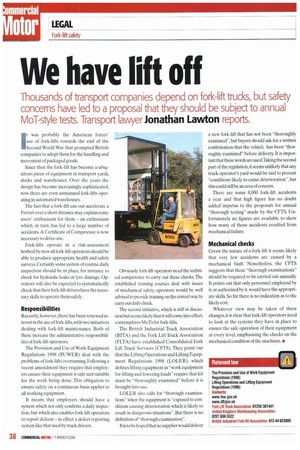Recently, however, there has been renewed interest in the use
Page 38

If you've noticed an error in this article please click here to report it so we can fix it.
of fork-lifts, with two initiatives dealing with fork-lift maintenance. Both of these increase the administrative responsibilities of fork-lift operators.
The Provision and Use of Work Equipment Regulations 1998 (PUWER) deal with the problems of fork-lifts overturning. Following a recent amendment they require that employers ensure their equipment is safe and suitable for the work being done. This obligation to ensure safety on a continuous basis applies to all working equipment.
It means that employers should have a system which not only confirms a daily inspection, but which also enables fork-lift operators to report defects — in effect a defect reporting system like that used by truck drivers. Obviously fork-lift operators need the technical competence to carry out these checks. The established training courses deal with issues of mechanical safety, operators would be well advised to provide training on the correct way to carry out daily check.
The second initiative, which is still in discussion but seems likely that it will come into effect, contemplates MoTs for fork-lifts.
The British Industrial Truck Association (BITA) and the Fork Lift Truck Association (FLTA) have established Consolidated Fork Lift Truck Services (CFTS). They point out that the Lifting Operations and Lifting Equipment Regulations 1998 (LOLER), which defines lifting equipment as "work equipment for lifting and lowering loads" require that kit must be "thoroughly examined" before it is brought into use.
LOLER also calls for "thorough examinations" when the equipment is "exposed to conditions causing deterioration which is likely to result in dangerous situations". But there is no definition of "thorough examination".
It is to be hoped that no supplier would deliver a new fork-lift that has not been "thoroughly examined", but buyers should ask for a written confirmation that the vehicle has been "thoroughly examined" before delivery. It is important that these words are used.Talcing the second part of the regulation, it seems unlikely that any truck operator's yard would be said to present "conditions likely to cause deterioration", but this could still be an area of concern.
There are some 8,000 fork-lift accidents a year and that high figure has no doubt added impetus to the proposals for annual "thorough testing" made by the CFTS. Unfortunately no figures are available to show how many of those accidents resulted from mechanical failure.
Mechanical checks
Given the nature of a fork-lift it seems likely that very few accidents are caused by a mechanical fault. Nonetheless, the LiIS suggests that these "thorough examinations" should be required to be carried out annually. It points out that only personnel employed by it, or authorised by it, would have the appropriate skills. So far there is no indication as to the likely cost.
Whatever view may be taken of these changes. it is clear that fork-lift operators need to look at the systems they have in place to ensure the safe operation of their equipment at every level, emphasising the checks on the mechanical condition of the machines.
































































































































































































